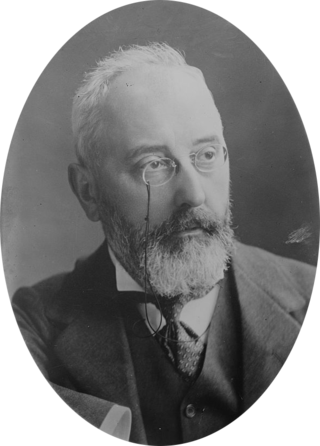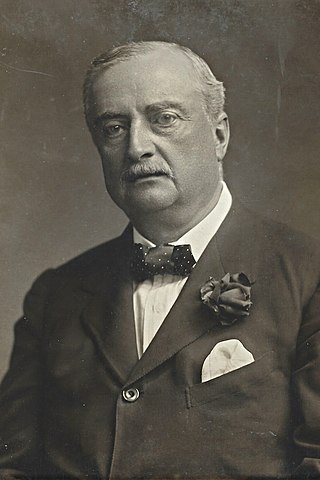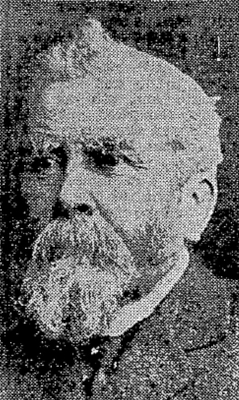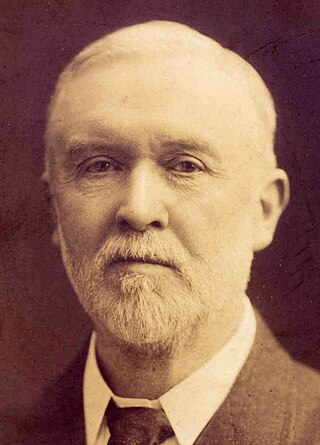
Timothy Michael Healy, KC was an Irish nationalist politician, journalist, author, barrister and a controversial Irish Member of Parliament (MP) in the House of Commons of the United Kingdom of Great Britain and Ireland. His political career began in the 1880s under Charles Stewart Parnell's leadership of the Irish Parliamentary Party (IPP) and continued into the 1920s, when he was the first governor-general of the Irish Free State.

John Edward Redmond was an Irish nationalist politician, barrister, and MP in the House of Commons of the United Kingdom. He was best known as leader of the moderate Irish Parliamentary Party (IPP) from 1900 until his death in 1918. He was also leader of the paramilitary organisation the Irish National Volunteers (INV).
The Nationalist Party was a term commonly used to describe a number of parliamentary political parties and constituency organisations supportive of Home Rule for Ireland from 1874 to 1922. It was also the name of the main Irish nationalist Nationalist Party in Northern Ireland from 1921 to 1978.

John Sweetman was an Irish nationalist politician who served as an Anti-Parnellite Irish National Federation Member of Parliament (MP) in the 1890s, but later radicalised. He was one of the founders of Sinn Féin and was the party's president from 1908 to 1911.

John Joseph Clancy, usually known as J. J. Clancy, was an Irish nationalist politician and Member of Parliament (MP) in the House of Commons for North Dublin from 1885 to 1918. He was one of the leaders of the later Irish Home Rule movement and promoter of the Housing of the Working Classes (Ireland) Act 1908, known as the Clancy Act. Called to the Irish Bar in 1887, he became a King's Counsel in 1906.

Patrick O'Brien was Irish Nationalist MP in the House Of Commons of the United Kingdom of Great Britain and Ireland and as member of the Irish Parliamentary Party represented North Monaghan (1886–1892) and Kilkenny City (1895–1917). He was Chief Whip of the Irish Party from 1907 until his death in 1917.

Edmund Leamy was an Irish journalist, barrister, author of fairy tales, and nationalist politician. He was a Member of Parliament (MP) in the House of Commons of the United Kingdom of Great Britain and Ireland as member of the Irish Parliamentary Party. A leading supporter of Charles Stewart Parnell, he represented various Irish seats for much of the period from 1880 until his death in 1904.
John Patrick Hayden was an Irish nationalist politician. As a member of the Irish Parliamentary Party, he served in the House of Commons of the United Kingdom of Great Britain and Ireland from 1897 to 1918 as Member of Parliament (MP) for South Roscommon. He was also editor and proprietor of the Westmeath Examiner, published in Mullingar, County Westmeath, and a member of the Irish Board of Agriculture. He was imprisoned four times by the British administration under different Coercion Acts.
John Howard Parnell was an older brother of the Irish Nationalist leader Charles Stewart Parnell and after his brother's death was himself a Parnellite Nationalist Member of Parliament, for South Meath from 1895 to 1900. From 1898 he was also Dublin City Marshal.

James Laurence Carew was an Irish nationalist politician and Member of Parliament (MP) in the House of Commons of the United Kingdom. A member of the Irish Parliamentary Party and later a Parnellite, he was MP for North Kildare from 1885 to 1892, for Dublin College Green from 1896–1900, and for South Meath from 1900 until he died in 1903.

James Rochfort Maguire was a British imperialist and Irish Nationalist politician and MP in the House of Commons of the United Kingdom of Great Britain and Ireland. As a member of the Irish Parliamentary Party he represented North Donegal (1890–92) and as a Parnellite Member he represented West Clare (1892–95). He was a friend and associate of Cecil Rhodes (1853–1902), and was one of the three men who signed the original concession on which was based the British South Africa Company, of which he was president in 1923–25.
Sir Henry Campbell was an Irish nationalist politician. He was Member of Parliament (MP) for South Fermanagh from 1885 to 1892, private secretary to the Irish leader Charles Stewart Parnell from 1880 to 1891, and Town Clerk of Dublin from 1893 to 1920.

John Gordon Swift MacNeill was an Irish Protestant Nationalist politician and MP, in the House of Commons of the United Kingdom of Great Britain and Ireland for South Donegal from 1887 until 1918, Professor of Constitutional and Criminal Law at the King's Inns, Dublin, 1882–88, and Professor of the Law of Public and Private Wrongs at the National University of Ireland from 1909. He was also a well-known author on law and nationalist issues, and became a QC in 1893.
James Gubbins Fitzgerald was a medical practitioner and an Irish nationalist politician and Member of Parliament (MP) in the House of Commons of the United Kingdom of Great Britain and Ireland. As a member of the Irish Parliamentary Party, he represented South Longford from 1888 to 1892. He was a strong supporter of Charles Stewart Parnell.
Garrett Michael Byrne was an Irish nationalist and MP in the House of Commons of the United Kingdom of Great Britain and Ireland and as member of the Irish Parliamentary Party represented County Wexford, 1880–83, and West Wicklow, 1885–92. He was a strong supporter of Charles Stewart Parnell.

Pierce Charles de Lacy O'Mahony, known up to 1901 as Pierce Mahony, and from 1912 also as The O'Mahony of Kerry, was an Irish nationalist politician and philanthropist, who practised as a barrister from 1898 to 1900. He was remarkable in having had successively three names, two wives and three faiths, and for being honoured by the Kings of two opposing countries in World War I.
Edward Sheil was Irish nationalist politician. He was a Member of Parliament (MP) for Athlone from 1874 to 1880, for Meath from 1882 to 1885, and for South Meath from 1885 to 1892, taking his seat in the House of Commons of the United Kingdom of Great Britain and Ireland.
Matthew Joseph Kenny was an Irish lawyer and Nationalist politician from County Clare. He was elected to the United Kingdom House of Commons at the age of 21, qualified as a barrister whilst still a member of parliament (MP), and later became a judge in the Irish Free State.
The 1891 Cork City by-election was a parliamentary by-election held for the United Kingdom House of Commons constituency of Cork City on 6 November 1891. It arose as a result of the death of the sitting member, Charles Stewart Parnell of the Irish Parliamentary Party.
The 1891 Waterford City by-election was a parliamentary by-election held for the United Kingdom House of Commons constituency of Waterford City on 23 December 1891. It arose as a result of the death of the sitting member, Richard Power of the Irish Parliamentary Party.









